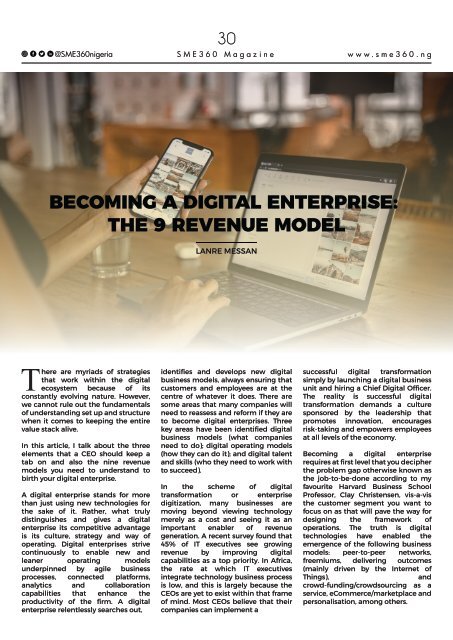FEBRUARY 2021 - MADE IN AFRICA ISSUE
Create successful ePaper yourself
Turn your PDF publications into a flip-book with our unique Google optimized e-Paper software.
@SME360nigeria<br />
30<br />
SME360 Magazine<br />
www.sme360.ng<br />
BECOM<strong>IN</strong>G A DIGITAL ENTERPRISE:<br />
THE 9 REVENUE MODEL<br />
LANRE MESSAN<br />
here are myriads of strategies<br />
that work within the digital<br />
ecosystem because of its<br />
constantly evolving nature. However,<br />
we cannot rule out the fundamentals<br />
of understanding set up and structure<br />
when it comes to keeping the entire<br />
value stack alive.<br />
In this article, I talk about the three<br />
elements that a CEO should keep a<br />
tab on and also the nine revenue<br />
models you need to understand to<br />
birth your digital enterprise.<br />
A digital enterprise stands for more<br />
than just using new technologies for<br />
the sake of it. Rather, what truly<br />
distinguishes and gives a digital<br />
enterprise its competitive advantage<br />
is its culture, strategy and way of<br />
operating. Digital enterprises strive<br />
continuously to enable new and<br />
leaner operating models<br />
underpinned by agile business<br />
processes, connected platforms,<br />
analytics and collaboration<br />
capabilities that enhance the<br />
productivity of the firm. A digital<br />
enterprise relentlessly searches out,<br />
identifies and develops new digital<br />
business models, always ensuring that<br />
customers and employees are at the<br />
centre of whatever it does. There are<br />
some areas that many companies will<br />
need to reassess and reform if they are<br />
to become digital enterprises. Three<br />
key areas have been identified digital<br />
business models (what companies<br />
need to do); digital operating models<br />
(how they can do it); and digital talent<br />
and skills (who they need to work with<br />
to succeed).<br />
In the scheme of digital<br />
transformation or enterprise<br />
digitization, many businesses are<br />
moving beyond viewing technology<br />
merely as a cost and seeing it as an<br />
important enabler of revenue<br />
generation. A recent survey found that<br />
45% of IT executives see growing<br />
revenue by improving digital<br />
capabilities as a top priority. In Africa,<br />
the rate at which IT executives<br />
integrate technology business process<br />
is low, and this is largely because the<br />
CEOs are yet to exist within that frame<br />
of mind. Most CEOs believe that their<br />
companies can implement a<br />
successful digital transformation<br />
simply by launching a digital business<br />
unit and hiring a Chief Digital Officer.<br />
The reality is successful digital<br />
transformation demands a culture<br />
sponsored by the leadership that<br />
promotes innovation, encourages<br />
risk-taking and empowers employees<br />
at all levels of the economy.<br />
Becoming a digital enterprise<br />
requires at first level that you decipher<br />
the problem gap otherwise known as<br />
the job-to-be-done according to my<br />
favourite Harvard Business School<br />
Professor, Clay Christensen, vis-a-vis<br />
the customer segment you want to<br />
focus on as that will pave the way for<br />
designing the framework of<br />
operations. The truth is digital<br />
technologies have enabled the<br />
emergence of the following business<br />
models: peer-to-peer networks,<br />
freemiums, delivering outcomes<br />
(mainly driven by the Internet of<br />
Things),<br />
and<br />
crowd-funding/crowdsourcing as a<br />
service, eCommerce/marketplace and<br />
personalisation, among others.








